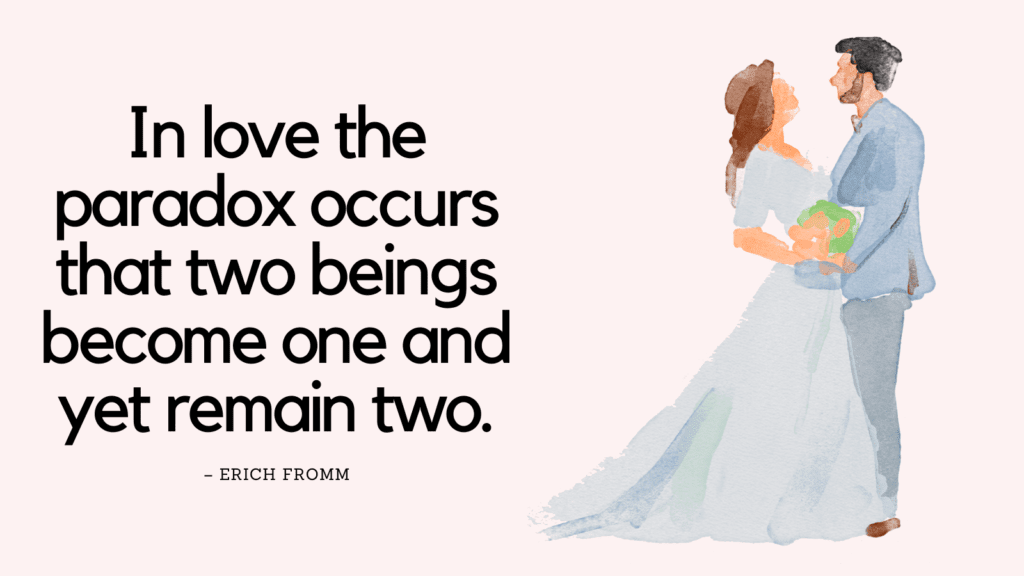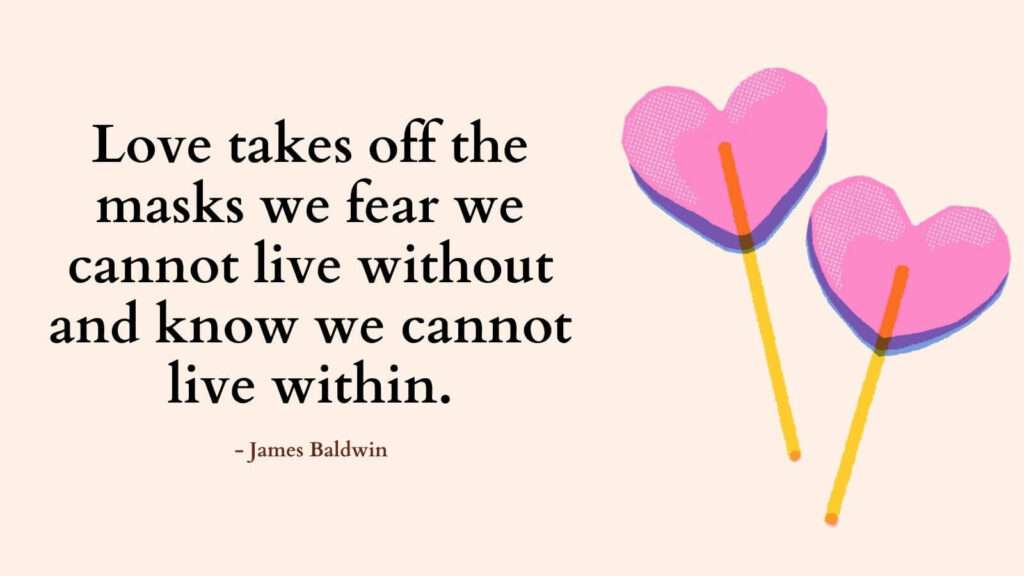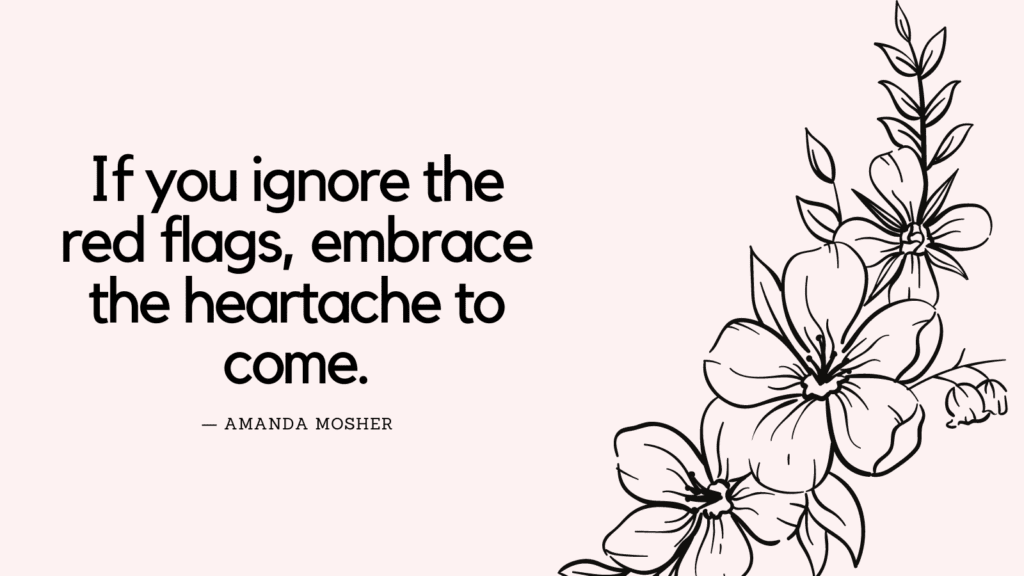This post contains some of the best psychological quotes about love.
Psychological Quotes About Love
1. “Not that people think that love is not important. They are starved for it; they watch endless numbers of films about happy and unhappy love stories, they listen to hundreds of trashy songs about love—yet hardly anyone thinks that there is anything that needs to be learned about love.” – Erich Fromm
2. “Most people see the problem of love primarily as that of being loved, rather than that of loving, of one’s capacity to love. Hence the problem to them is how to be loved, how to be lovable.” – Erich Fromm
3. “People think that to love is simple, but that to find the right object to love—or to be loved by—is difficult. This attitude has several reasons rooted in the development of modern society.” – Erich Fromm
4. “Two persons thus fall in love when they feel they have found the best object available on the market, considering the limitations of their own exchange values.” – Erich Fromm
5. “The first step to take is to become aware that love is an art, just as living is an art; if we want to learn how to love we must proceed in the same way we have to proceed if we want to learn any other art, say music, painting, carpentry, or the art of medicine or engineering.” – Erich Fromm
6. “Without love, humanity could not exist for a day.” – Erich Fromm
Related: Affection Quiz (+3 Strategies To Increase Affection In Your Relationship)
7. “Fusion can be achieved in different ways—and the differences are not less significant than what is common to the various forms of love. Should they all be called love? Or should we reserve the word “love” only for a specific kind of union, one which has been the ideal virtue in all great humanistic religions and philosophical systems of the last four thousand years of Western and Eastern history?” – Erich Fromm
8. “Love is an active power in man; a power which breaks through the walls which separate man from his fellow men, which unites him with others; love makes him overcome the sense of isolation and separateness, yet it permits him to be himself, to retain his integrity.” – Erich Fromm
9. “In love the paradox occurs that two beings become one and yet remain two.” – Erich Fromm
10. “Love is an action, the practice of a human power, which can be practiced only in freedom and never as the result of a compulsion.” – Erich Fromm
11. “Love is an activity, not a passive affect; it is a “standing in,” not a “falling for.”” – Erich Fromm
Related: What Is Confluent Love?
12. “In the most general way, the active character of love can be described by stating that love is primarily giving, not receiving.” – Erich Fromm
13. “Love is a power which produces love; impotence is the inability to produce love.” – Erich Fromm
14. “But not only in love does giving mean receiving. The teacher is taught by his students, the actor is stimulated by his audience, the psychoanalyst is cured by his patient— provided they do not treat each other as objects, but are related to each other genuinely and productively.” – Erich Fromm
15. “It is hardly necessary to stress the fact that the ability to love as an act of giving depends on the character development of the person.” – Erich Fromm
16. “Beyond the element of giving, the active character of love becomes evident in the fact that it always implies certain basic elements, common to all forms of love. These are care, responsibility, respect and knowledge.” – Erich Fromm
17. “That love implies care is most evident in a mother’s love for her child.” – Erich Fromm
18. “One of the best models of love is how parents love their children. Parents really love their children. At the same time, sometimes they don’t like them – they get bored of them, they think they’re awful, they want a break from them. And all those things go on in the love that an adult might have for another, too: sometimes we’re fed up and aware of somebody’s glaring faults, but still very much on their side. They annoy us and we still love them.” –Alain de Botton
19. “Love is the active concern for the life and the growth of that which we love. Where this active concern is lacking, there is no love.” – Erich Fromm
Related: Is It ROCD Or Am I Not In Love? Top 4 Powerful Ways to Overcome Relationship Anxiety And ROCD
20. “One loves that for which one labors, and one labors for that which one loves.” – Erich Fromm
21. “Care and concern imply another aspect of love; that of responsibility. Today responsibility is often meant to denote duty, something imposed upon one from the outside. But responsibility, in its true sense, is an entirely voluntary act; it is my response to the needs, expressed or unexpressed, of another human being.” – Erich Fromm
22. “Psychology as a science has its limitations, and, as the logical consequence of theology is mysticism, so the ultimate consequence of psychology is love.” – Erich Fromm
23. “Love is not primarily a relationship to a specific person; it is an attitude, an orientation of character which determines the relatedness of a person to the world as a whole, not toward one “object” of love.” – Erich Fromm
24. “If I truly love one person I love all persons, I love the world, I love life.” – Erich Fromm
25. “Saying that love is an orientation which refers to all and not to one does not imply, however, the idea that there are no differences between various types of love, which depend on the kind of object which is loved.” – Erich Fromm
26. “The most fundamental kind of love, which underlies all types of love, is brotherly love. By this I mean the sense of responsibility, care, respect, knowledge of any other human being, the wish to further his life.” – Erich Fromm
Related: Top 5 Tips On How To Recover From Love Addiction
27. “Brotherly love is love for all human beings; it is characterized by its very lack of exclusiveness. If I have developed the capacity for love, then I cannot help loving my brothers. In brotherly love there is the experience of union with all men, of human solidarity, of human atonement.” – Erich Fromm
28. “Motherly love for the growing child, love which wants nothing for oneself, is perhaps the most difficult form of love to be achieved, and all the more deceptive because of the ease with which a mother can love her small infant” – Erich Fromm
29. “If the desire for physical union is not stimulated by love, if erotic love is not also brotherly love, it never leads to union in more than an orgiastic, transitory sense.” – Erich Fromm
30. “Erotic love, if it is love, has one premise. That I love from the essence of my being—and experience the other person in the essence of his or her being. In essence, all human beings are identical. We are all part of One; we are One.” – Erich Fromm
Related: Love Addiction Test (+ Resources For Love Addiction)
31. “Sometimes the longing for a partner can be so strong it seems irrational. If we look at what human beings are evolved to be, though, that longing makes perfect sense: we became what we are through love.” – Leslie Becker-Phelps
32. “We may grow out of babyhood, but we never lose our innate need for connection. We simply transfer our attachment from our primary caretaker to a new base, if we can find one—and for most of us, that’s a romantic partner.” – Leslie Becker-Phelps
33. “Falling in love, along with becoming a parent, are the two major neuromodulators of life, literally reshaping our brains. Just as a nurturing parent can make a contented baby, so a healthy, loving, romantic relationship can make us happier, more confident, and even— as we’ll see later—more independent.” – Leslie Becker-Phelps
34. “We’re a social species because nothing but a deep bond of love keeps us together when we need it most—back in our own infancy, and way back in the infancy of the human species.” – Leslie Becker-Phelps
35. “Biologically speaking, we are all created for love.” – Leslie Becker-Phelps
36. “We learn early in life what to expect from other people, and those expectations continue to shape our actions when it comes to love. Seen through the lens of psychology’s attachment theory, a lot of seemingly strange behavior becomes clear.” – Leslie Becker-Phelps
37. “Why do some of us fall in love quickly and some of us never quite feel we have fallen in love? The answer may lie in our past attachments: our own attitudes can be as important as meeting the right person.” – Leslie Becker-Phelps
38. “Psychologist Robert Sternberg suggests that love is made up of three components: passion, closeness (which he calls intimacy), and commitment. If you are avoidant, you may be trying to steer clear of commitment as well as intimacy, but if you’re anxious, you may jump to commit before you’re truly intimate.” – Leslie Becker-Phelps
39. “Romantic love is the single greatest energy system in the Western psyche. In our culture it has supplanted religion as the arena in which men and women seek meaning, transcendence, wholeness, and ecstasy.” – Robert A. Johnson
40. “Romantic love is not just a form of “love,” it is a whole psychological package—a combination of beliefs, ideals, attitudes, and expectations. These often contradictory ideas coexist in our unconscious minds and dominate our reactions and behavior, without our being aware of them.” – Robert A. Johnson
41. “For romantic love doesn’t just mean loving someone; it means being “in love.” This is a psychological phenomenon that is very specific. When we are “in love” we believe we have found the ultimate meaning of life, revealed in another human being. We feel we are finally completed, that we have found the missing parts of ourselves. Life suddenly seems to have a wholeness, a superhuman intensity that lifts us high above the ordinary plain of existence. For us, these are the sure signs of “true love.”” – Robert A. Johnson




